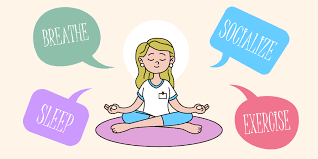Addiction: Understanding the Cycle and Seeking Help
Addiction is a complex and often misunderstood condition that affects millions of people worldwide. It can take many forms, from substance abuse to gambling, gaming, and even social media. Addiction is characterized by compulsive behavior that persists despite negative consequences, such as health problems, financial difficulties, and strained relationships.
The cycle of addiction typically begins with experimentation or occasional use of a substance or behavior. Over time, the person may develop a tolerance to the substance or activity, requiring more to achieve the same effect. This can lead to physical dependence and withdrawal symptoms when attempting to quit.
Addiction also has a psychological component that can be difficult to overcome. The person may experience intense cravings for the substance or activity and feel unable to control their behavior. This can lead to feelings of guilt, shame, and isolation.
Fortunately, addiction is treatable with professional help. Treatment options include therapy, medication-assisted treatment (MAT), support groups such as Alcoholics Anonymous (AA) or Narcotics Anonymous (NA), and inpatient rehabilitation programs.
Therapy can help individuals identify triggers for their addictive behavior and develop coping strategies for managing cravings and avoiding relapse. MAT involves the use of medications such as methadone or buprenorphine to reduce withdrawal symptoms and cravings for opioids.
Support groups provide a sense of community and accountability for those in recovery. Inpatient rehabilitation programs offer intensive treatment in a supportive environment away from triggers and distractions.
It’s important to understand that addiction is not a moral failing or lack of willpower but rather a medical condition that requires treatment. Seeking help is not a sign of weakness but rather a courageous step towards recovery.
If you or someone you know is struggling with addiction, don’t hesitate to seek help. Talk to your doctor or contact a local treatment center for more information on available resources. Remember that recovery is possible with the right support and commitment.
9 Tips for Managing Addiction and Staying Sober
- Avoid people, places, and things that may trigger cravings for the addictive substance or behavior.
- Make a list of activities to do instead of engaging in the addiction, such as reading a book or going for a walk.
- Reach out to supportive family members and friends who can provide encouragement and understanding.
- Join support groups or online forums where you can connect with others who are struggling with similar issues.
- Practice relaxation techniques such as deep breathing, meditation, yoga, or progressive muscle relaxation to help manage stress and cravings.
- Get enough restful sleep every night so that you have the energy to stay focused on your recovery goals during the day .
- Exercise regularly to boost endorphins and help reduce stress levels .
- Eat healthy meals throughout the day to keep your energy levels up and maintain good physical health .
- Seek professional help from an addiction counselor if needed .
Avoid people, places, and things that may trigger cravings for the addictive substance or behavior.
Avoiding Triggers: A Key Tip for Overcoming Addiction
When it comes to addiction recovery, avoiding triggers is a crucial step towards success. Triggers can be people, places, or things that remind you of the addictive substance or behavior and may lead to cravings and relapse.
For example, if you’re recovering from alcohol addiction, going to a bar or hanging out with friends who drink heavily can trigger cravings. Similarly, if you’re trying to quit smoking, being around others who smoke or seeing cigarette advertisements can be difficult to resist.
To overcome addiction and maintain sobriety, it’s important to identify your triggers and develop strategies for avoiding them. This may involve changing your daily routine, finding new hobbies or activities that don’t involve the addictive substance or behavior, and avoiding certain people or places that may trigger cravings.
It’s also important to have a support system in place. This can include friends and family members who are supportive of your recovery journey as well as professional help such as therapy or support groups.
Remember that recovery is a process and there may be setbacks along the way. If you do experience a relapse, don’t give up hope. Instead, use it as an opportunity to learn from your experience and make adjustments to your recovery plan.
Avoiding triggers may not always be easy but it is an essential part of overcoming addiction. With commitment, support, and effective coping strategies in place, you can successfully navigate the challenges of recovery and live a fulfilling life free from addiction.
Make a list of activities to do instead of engaging in the addiction, such as reading a book or going for a walk.
One of the most effective ways to overcome addiction is to replace the addictive behavior with healthier activities. Making a list of alternative activities can help individuals break the cycle of addiction and develop new, positive habits.
When creating a list, it’s important to choose activities that are enjoyable and fulfilling. This can include reading a book, going for a walk, practicing yoga or meditation, or spending time with friends and family. The key is to find activities that provide a sense of satisfaction and pleasure without relying on the addictive substance or behavior.
Having a list of alternative activities can also help individuals manage cravings and avoid triggers. When the urge to engage in the addictive behavior arises, they can turn to their list for inspiration and choose an activity that will help them stay on track.
It’s important to remember that recovery is a process and may involve setbacks along the way. However, by focusing on healthy alternatives and developing new habits, individuals can break free from addiction and live fulfilling lives.
If you or someone you know is struggling with addiction, consider making a list of alternative activities as a first step towards recovery. With commitment and support, it’s possible to overcome addiction and achieve lasting health and wellness.
Reach out to supportive family members and friends who can provide encouragement and understanding.
Dealing with addiction can be a lonely and isolating experience. It’s essential to have a support system in place that can provide encouragement and understanding during the recovery process. One of the most important things you can do is reach out to supportive family members and friends.
Supportive family members and friends can play a crucial role in helping you overcome addiction. They can offer emotional support, encouragement, and understanding during difficult times. They can also help you stay accountable by checking in on your progress and providing motivation to stay on track.
It’s important to choose people who are trustworthy, non-judgmental, and genuinely care about your well-being. These individuals should be willing to listen without criticism or judgment and offer positive reinforcement for your efforts.
Reaching out for help can be challenging, but it’s essential to remember that addiction is not something you have to face alone. There are people who care about you and want to see you succeed in your recovery journey.
If you’re struggling with addiction, consider reaching out to supportive family members or friends for help. You may also want to consider joining a support group or seeking professional treatment from a therapist or addiction specialist. Remember that recovery is possible with the right support system in place.
Join support groups or online forums where you can connect with others who are struggling with similar issues.
Joining support groups or online forums can be an effective way to cope with addiction. These groups provide a sense of community and a safe space for individuals to share their experiences and feelings with others who are going through similar struggles.
Support groups can also offer valuable resources and information on available treatment options, as well as tips for managing cravings and avoiding relapse. Members can provide emotional support, encouragement, and accountability for each other, which can be especially helpful during difficult times.
Online forums offer the convenience of connecting with others from the comfort of your own home. They also provide anonymity for those who may be hesitant to share their struggles in person. However, it’s important to exercise caution when participating in online forums and only share personal information with trusted members.
Joining support groups or online forums is not a substitute for professional treatment but rather a complementary tool for recovery. It’s important to continue seeking professional help while also connecting with others who understand what you’re going through.
If you’re struggling with addiction, consider joining a support group or online forum today. You don’t have to go through this alone. Remember that recovery is possible with the right support and commitment.
Practice relaxation techniques such as deep breathing, meditation, yoga, or progressive muscle relaxation to help manage stress and cravings.
Addiction is a complex and challenging condition that can have a significant impact on an individual’s life. Stress and cravings are common triggers that can lead to relapse, making it essential to develop healthy coping mechanisms. One helpful tip for managing stress and cravings is to practice relaxation techniques such as deep breathing, meditation, yoga, or progressive muscle relaxation.
Deep breathing involves taking slow, deep breaths and focusing on the sensation of the air moving in and out of your body. This technique can help reduce stress and anxiety while promoting relaxation.
Meditation involves sitting quietly and focusing your attention on your breath or a specific object or phrase. This practice can help calm the mind and reduce stress.
Yoga combines physical postures with breath control and meditation to promote relaxation, flexibility, and strength.
Progressive muscle relaxation involves tensing and relaxing different muscle groups in the body to release tension and promote relaxation.
By incorporating these techniques into your daily routine, you can develop healthy habits for managing stress and cravings. These practices can also improve overall well-being by reducing anxiety, promoting better sleep quality, and increasing mindfulness.
If you’re struggling with addiction, remember that seeking professional help is essential for long-term recovery. However, practicing relaxation techniques can be a helpful tool in managing stress and cravings along the way. With commitment, support, and healthy coping mechanisms like these techniques, recovery is possible.
Get enough restful sleep every night so that you have the energy to stay focused on your recovery goals during the day .
Getting Enough Restful Sleep: A Key to Overcoming Addiction
Addiction recovery is a challenging journey that requires focus, determination, and energy. One often overlooked aspect of recovery is the importance of getting enough restful sleep every night. Sleep plays a crucial role in our physical and mental health, and lack of sleep can have a negative impact on our ability to stay focused on our recovery goals.
During sleep, our bodies and minds undergo a process of restoration and repair. Our brains consolidate memories and process emotions, while our bodies release hormones that regulate appetite, metabolism, and immune function. Without enough restful sleep, we may experience fatigue, irritability, difficulty concentrating, and increased risk of relapse.
To ensure that you are getting enough restful sleep during addiction recovery, it’s important to establish healthy sleep habits. This includes maintaining a consistent sleep schedule, creating a relaxing bedtime routine, avoiding caffeine and alcohol before bed, and creating a comfortable sleep environment.
In addition to these habits, it’s also important to address any underlying sleep disorders or mental health conditions that may be contributing to poor sleep quality. This may involve seeking treatment from a healthcare professional or therapist who specializes in addiction recovery.
By prioritizing restful sleep as part of your addiction recovery journey, you can improve your overall health and well-being while increasing your chances of success in achieving your recovery goals. So don’t underestimate the power of a good night’s sleep – it just might be the key to unlocking your full potential in overcoming addiction.
Exercise regularly to boost endorphins and help reduce stress levels .
Exercise Regularly to Help Overcome Addiction
Addiction is a challenging condition that can have a significant impact on physical and mental health. One effective way to manage addiction is through regular exercise. Exercise has been shown to boost endorphins, which are natural mood-boosting chemicals in the brain. Endorphins can help reduce stress levels and promote feelings of well-being, making it easier to manage cravings and overcome addictive behavior.
Regular exercise can also help improve overall physical health, which is often compromised by addiction. Substance abuse can lead to poor nutrition, lack of sleep, and decreased physical activity, all of which can contribute to a range of health problems such as obesity, heart disease, and diabetes.
Incorporating regular exercise into a daily routine can be an effective way to address these issues and improve overall health. Exercise doesn’t have to be intense or time-consuming; even light activity such as walking or yoga can be beneficial.
It’s important to note that exercise alone may not be enough to overcome addiction; professional treatment and support are often necessary for successful recovery. However, incorporating regular exercise into a comprehensive treatment plan can provide additional benefits for both physical and mental health.
If you’re struggling with addiction, consider adding regular exercise to your routine. Talk to your doctor or therapist about developing an exercise plan that works for you. Remember that recovery is possible with the right support and commitment.
Eat healthy meals throughout the day to keep your energy levels up and maintain good physical health .
Eating healthy meals throughout the day is an important tip for those struggling with addiction. Addiction can take a toll on the body, leading to poor nutrition and overall physical health. Eating regular, balanced meals can help to maintain energy levels and support physical health.
When we eat healthy foods, our bodies receive the nutrients they need to function properly. This includes essential vitamins and minerals that help to keep our immune system strong and promote overall well-being. Eating a balanced diet can also help to stabilize blood sugar levels, reducing cravings for substances or behaviors that provide a temporary energy boost.
For those in recovery from addiction, maintaining good physical health is especially important. It can be tempting to turn to unhealthy foods or skip meals altogether when dealing with the challenges of recovery. However, doing so can lead to further physical and emotional stress.
By eating healthy meals throughout the day, individuals in recovery can support their overall well-being and maintain stable energy levels. This can help them to stay focused on their recovery goals and resist urges to engage in addictive behaviors.
Incorporating healthy foods into your diet doesn’t have to be complicated or expensive. Simple changes like adding more fruits and vegetables, choosing whole grains over processed foods, and limiting sugary beverages can make a big difference in overall health.
In conclusion, eating healthy meals throughout the day is an important tip for those struggling with addiction. By supporting physical health and maintaining energy levels, individuals in recovery can stay focused on their goals and resist urges to engage in addictive behaviors.
Seek professional help from an addiction counselor if needed .
Addiction can be a difficult and overwhelming experience to overcome. While some people may be able to quit on their own, others may need professional help from an addiction counselor.
An addiction counselor is a trained professional who specializes in helping individuals overcome addiction. They can provide guidance, support, and resources to help individuals understand the underlying causes of their addiction and develop strategies for managing cravings and avoiding relapse.
Addiction counselors use a variety of evidence-based treatment methods, including cognitive-behavioral therapy (CBT), motivational interviewing (MI), and dialectical behavior therapy (DBT). These therapies can help individuals identify triggers for their addictive behavior, develop coping strategies for managing cravings, and improve communication skills to strengthen relationships.
Seeking professional help from an addiction counselor is not a sign of weakness but rather a courageous step towards recovery. It takes strength and courage to admit that you need help and to take action towards healing.
If you or someone you know is struggling with addiction, don’t hesitate to seek professional help. Talk to your doctor or contact a local treatment center for more information on available resources. Remember that recovery is possible with the right support and commitment.




